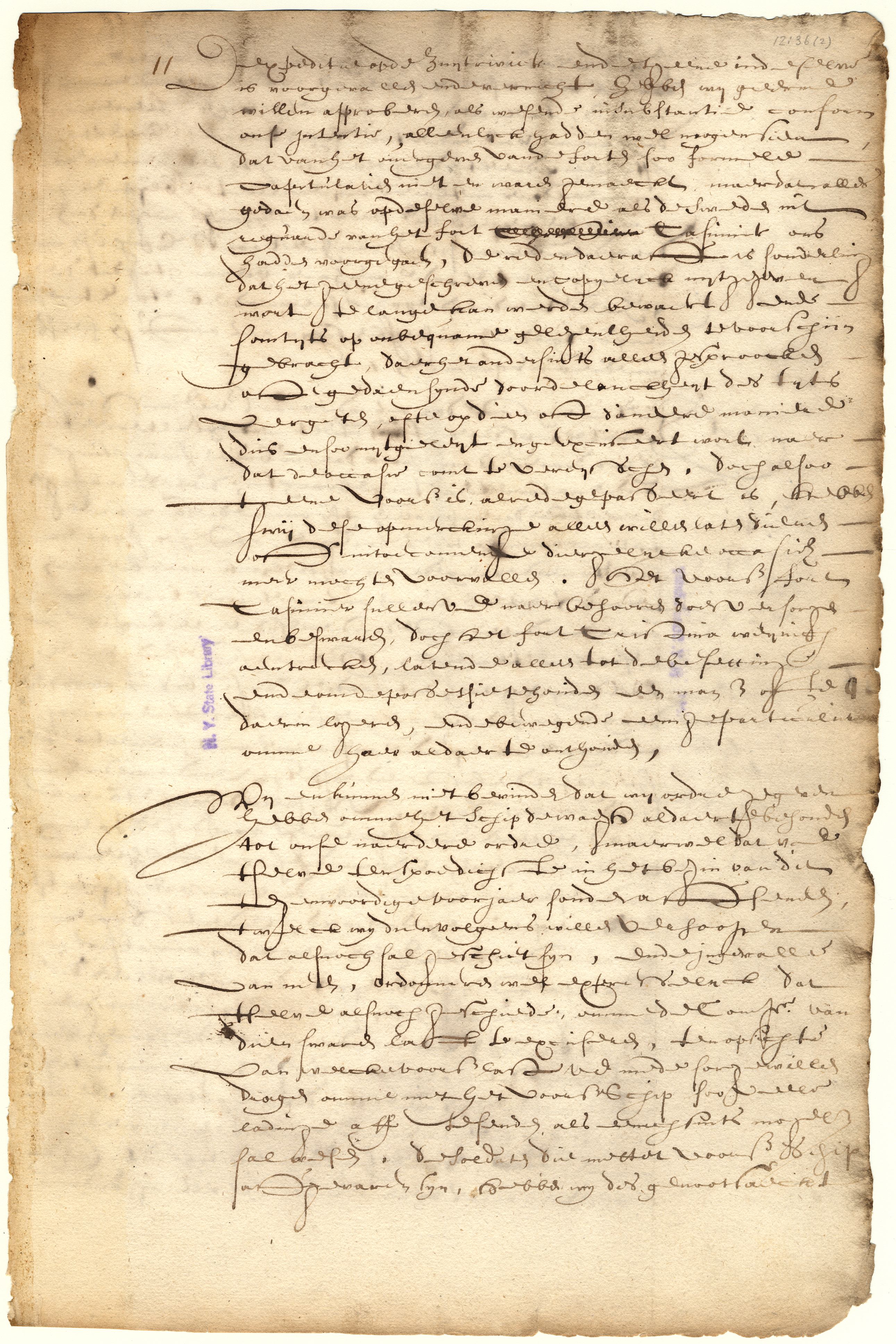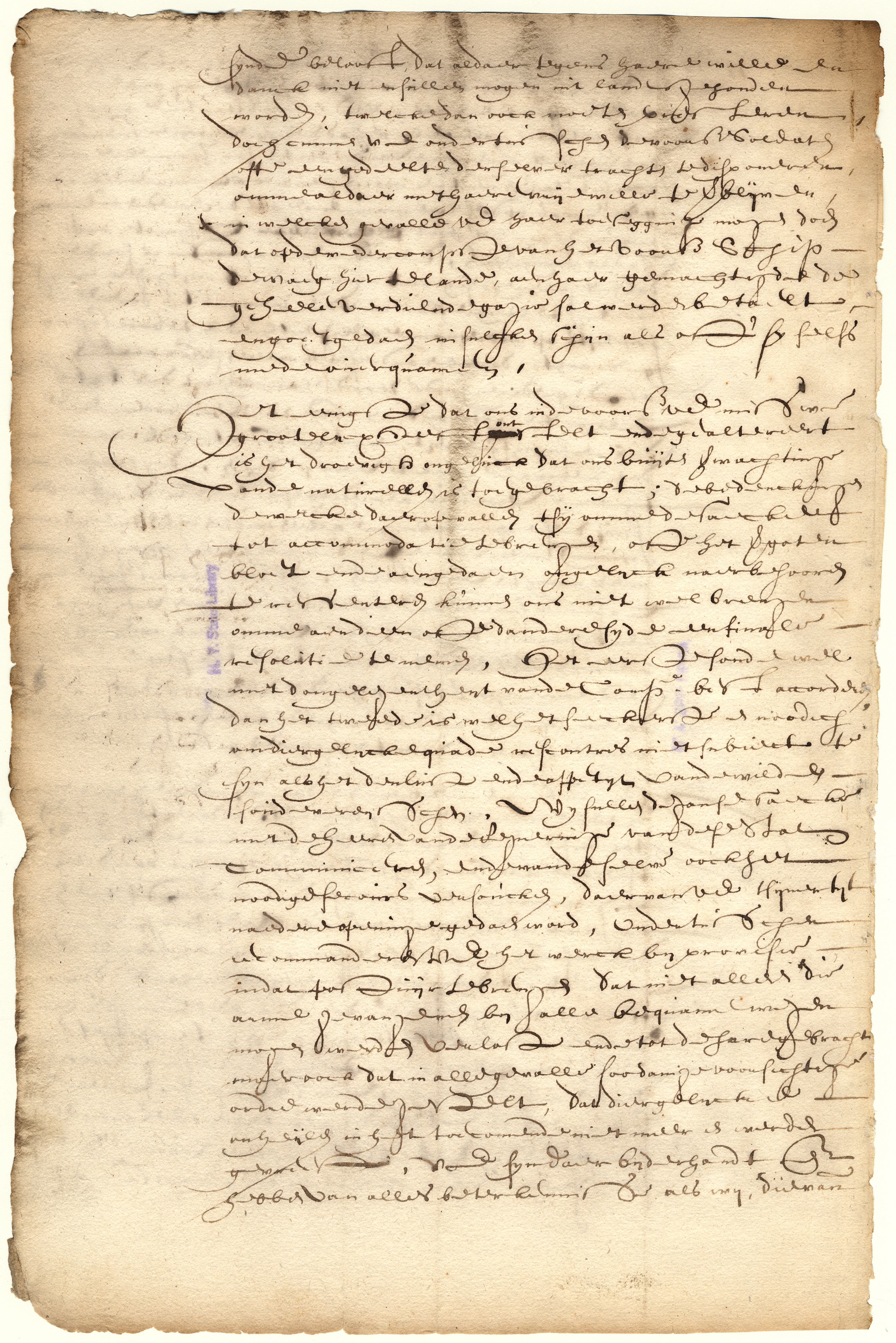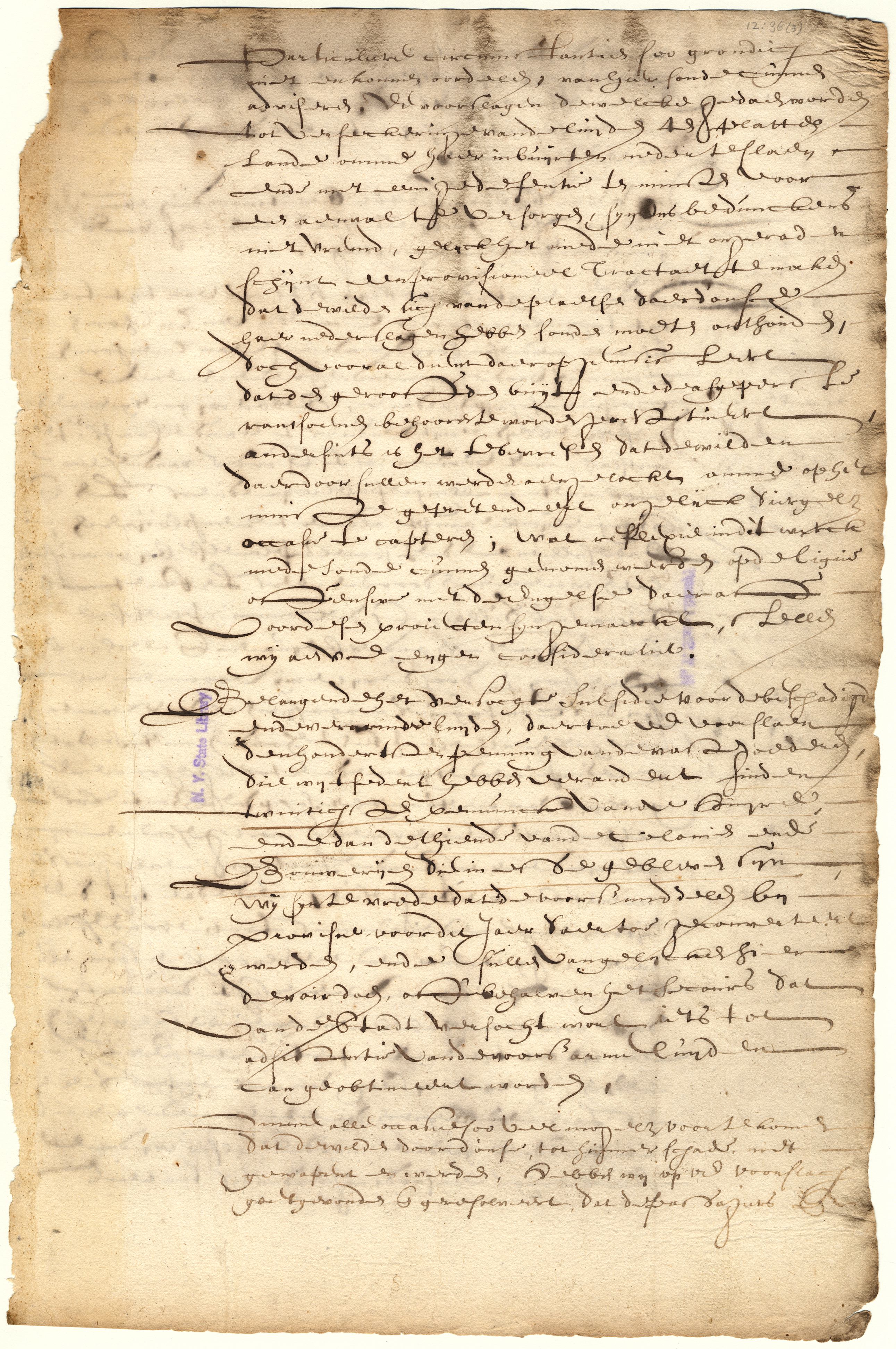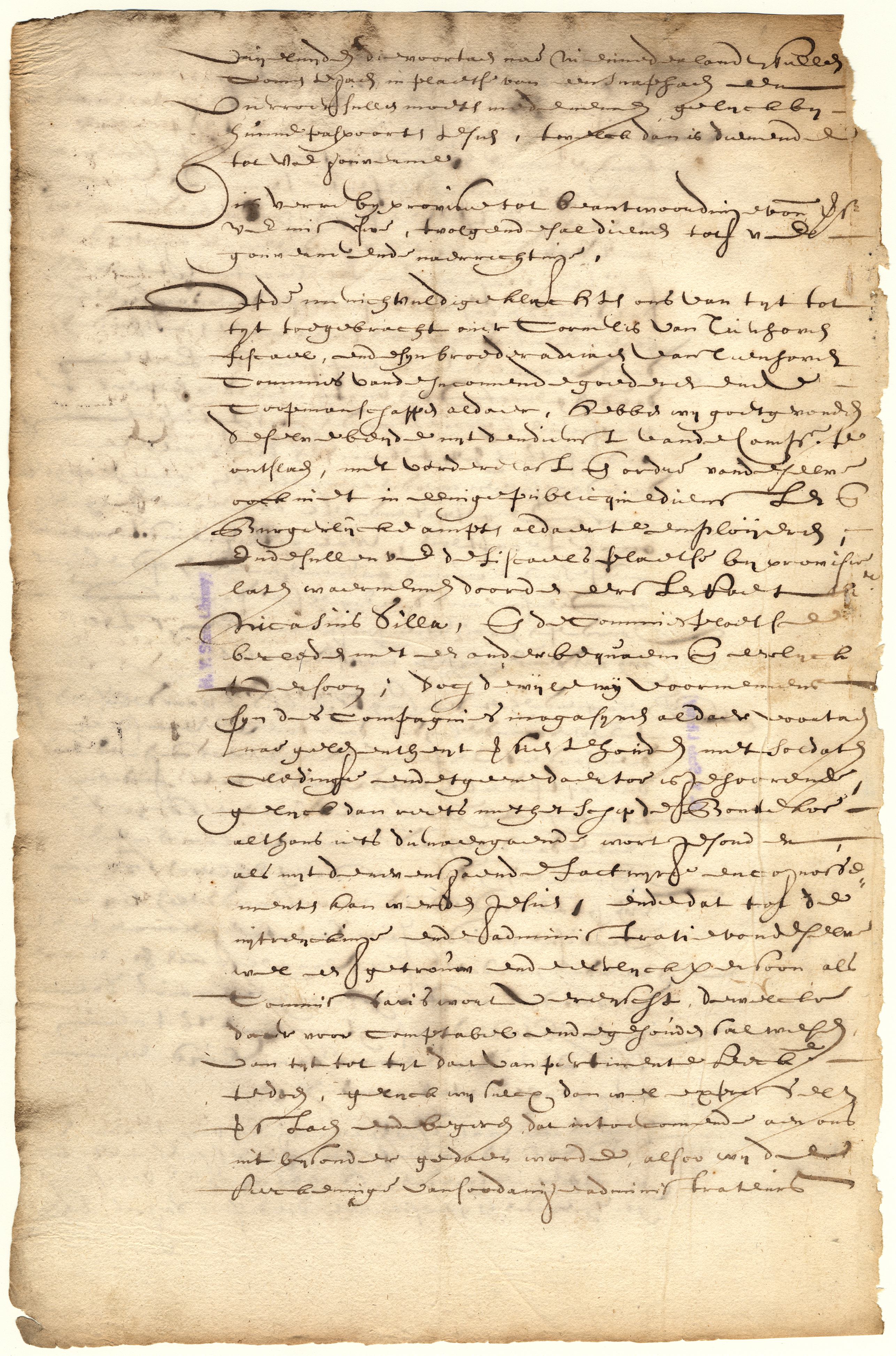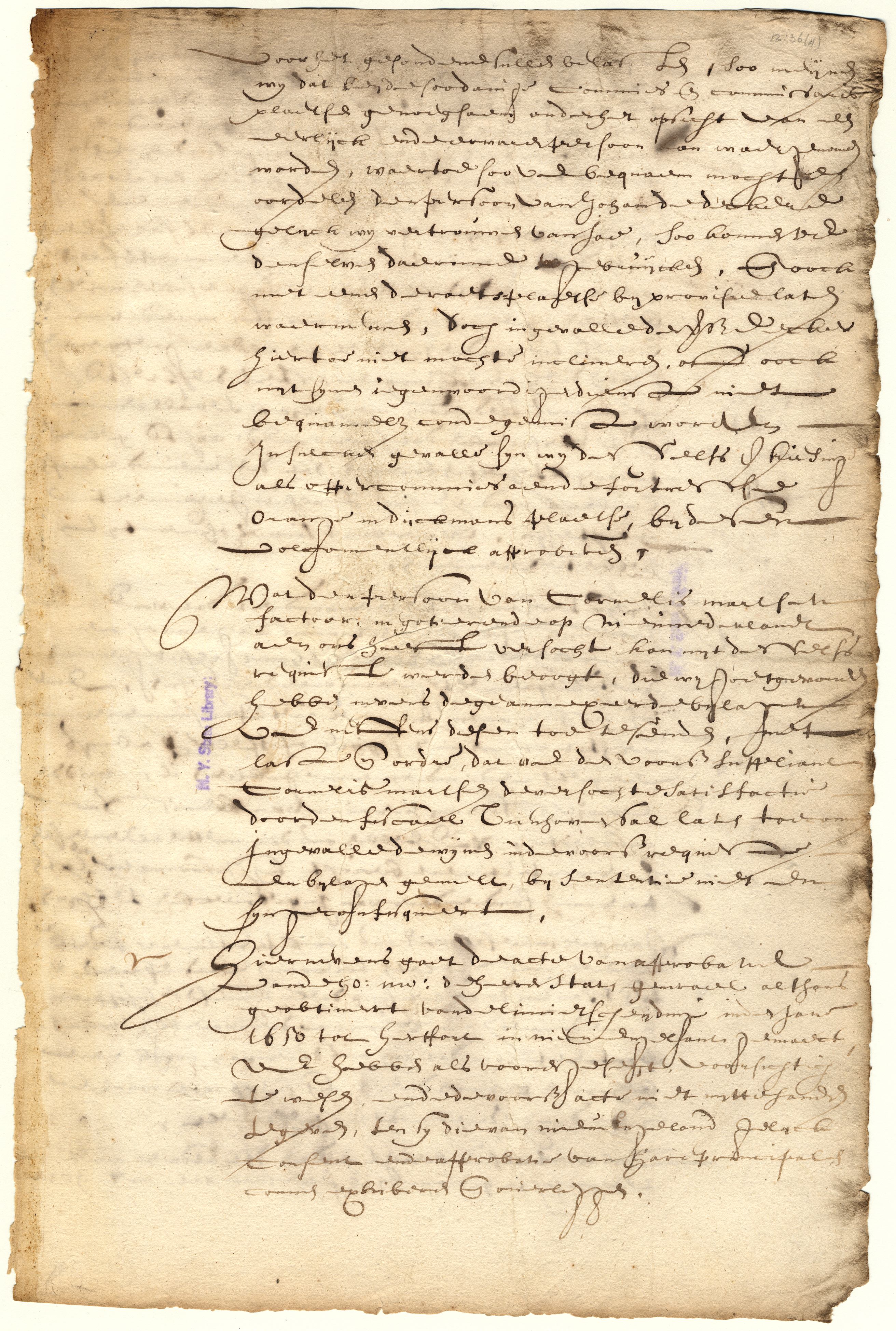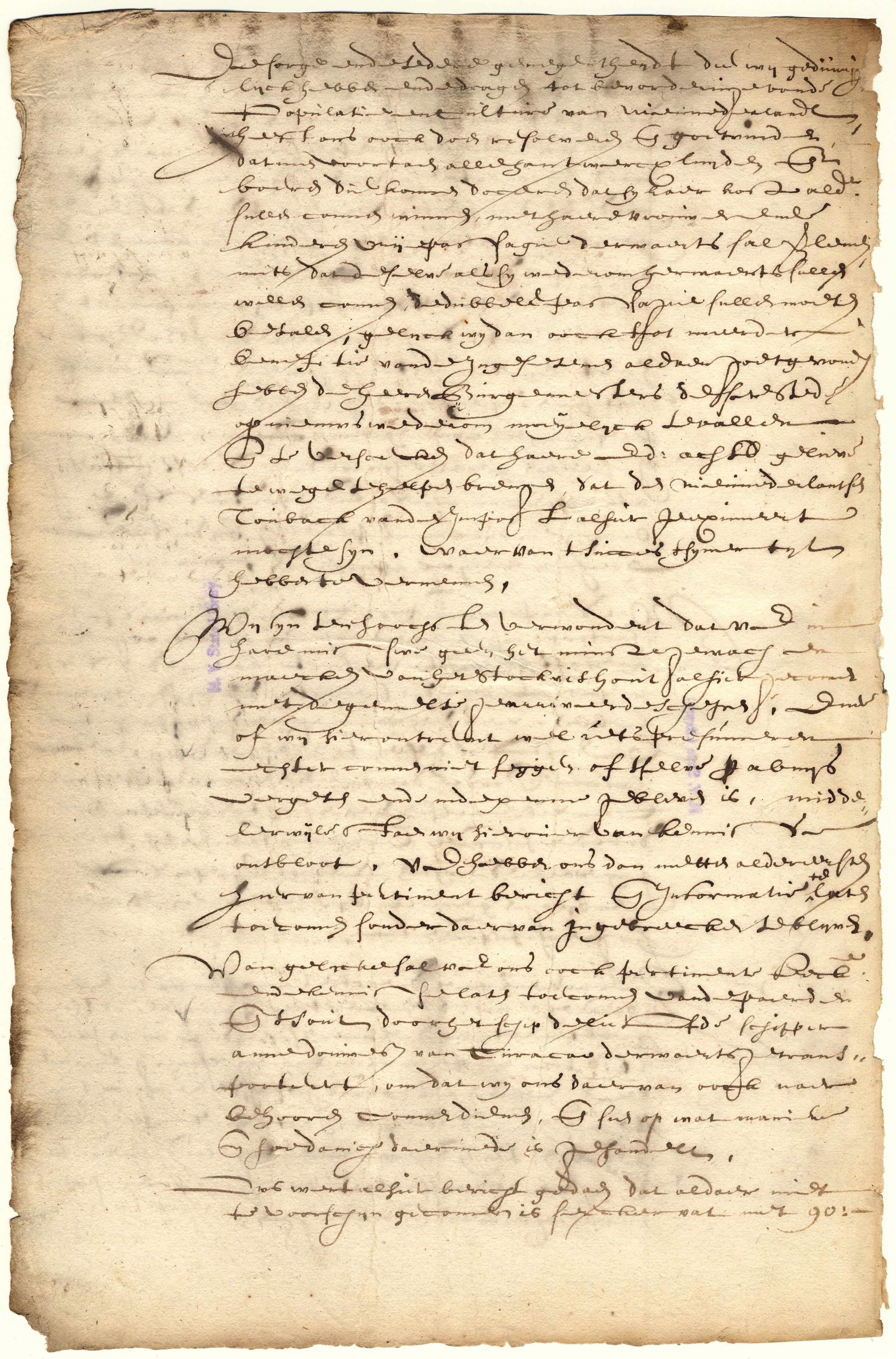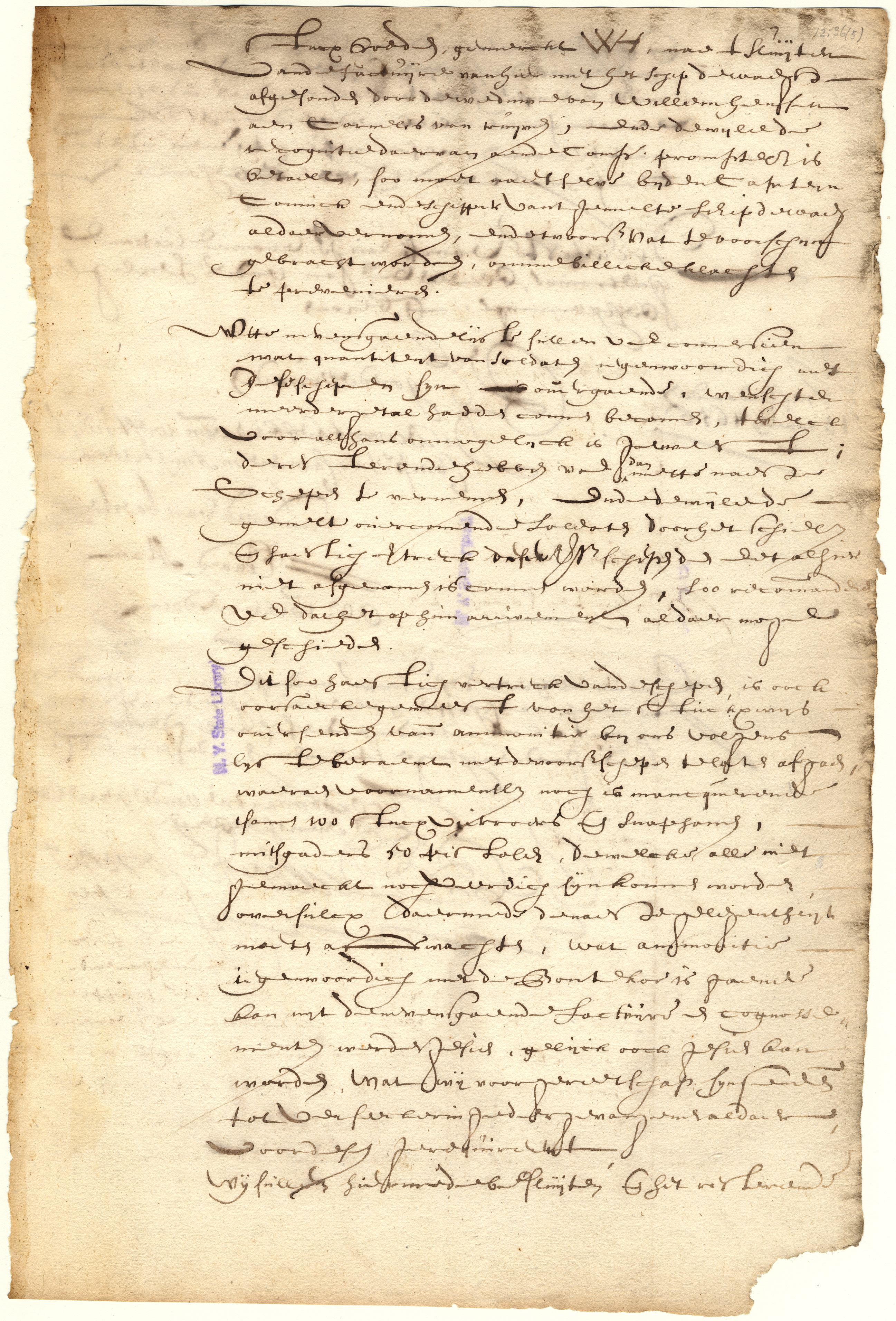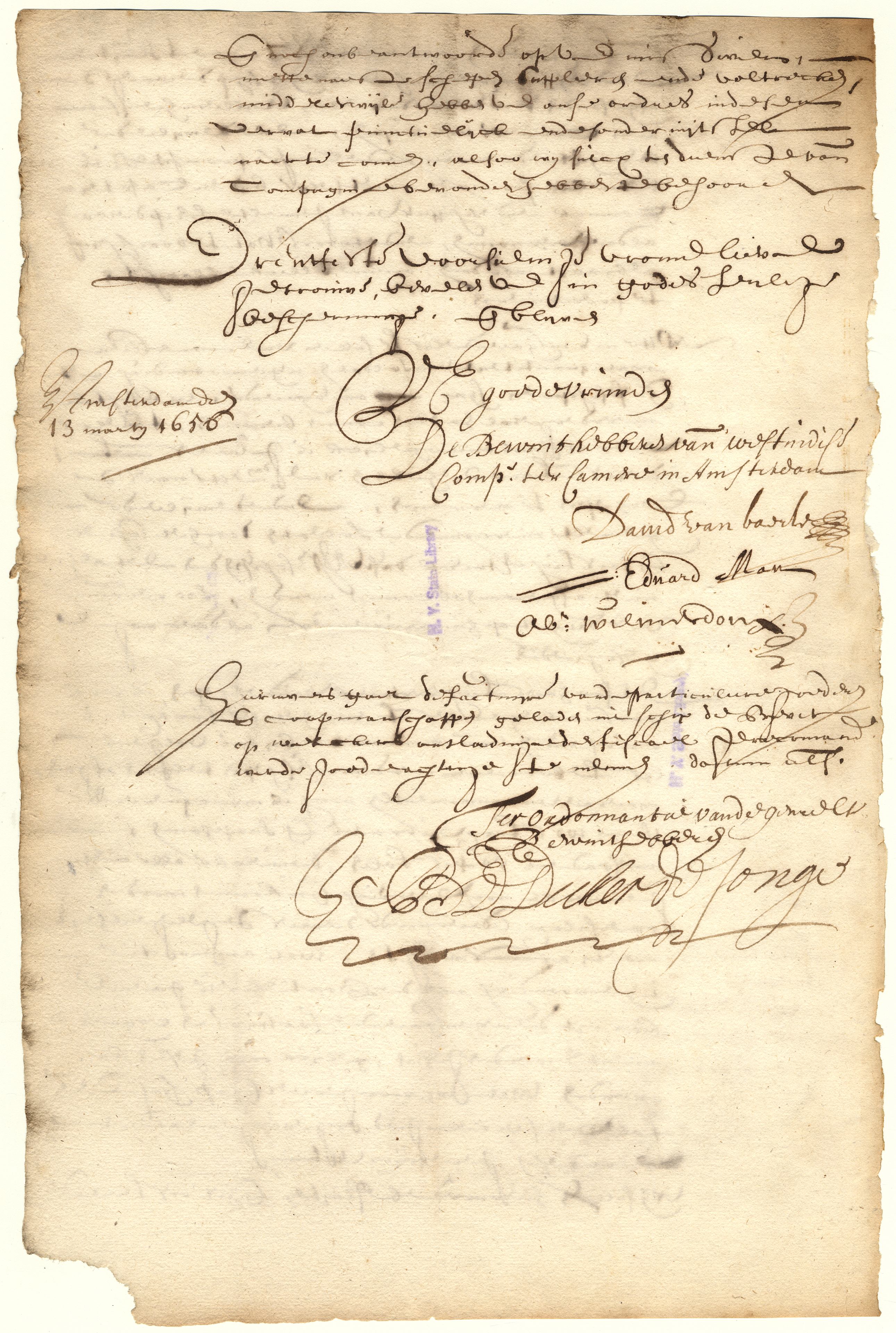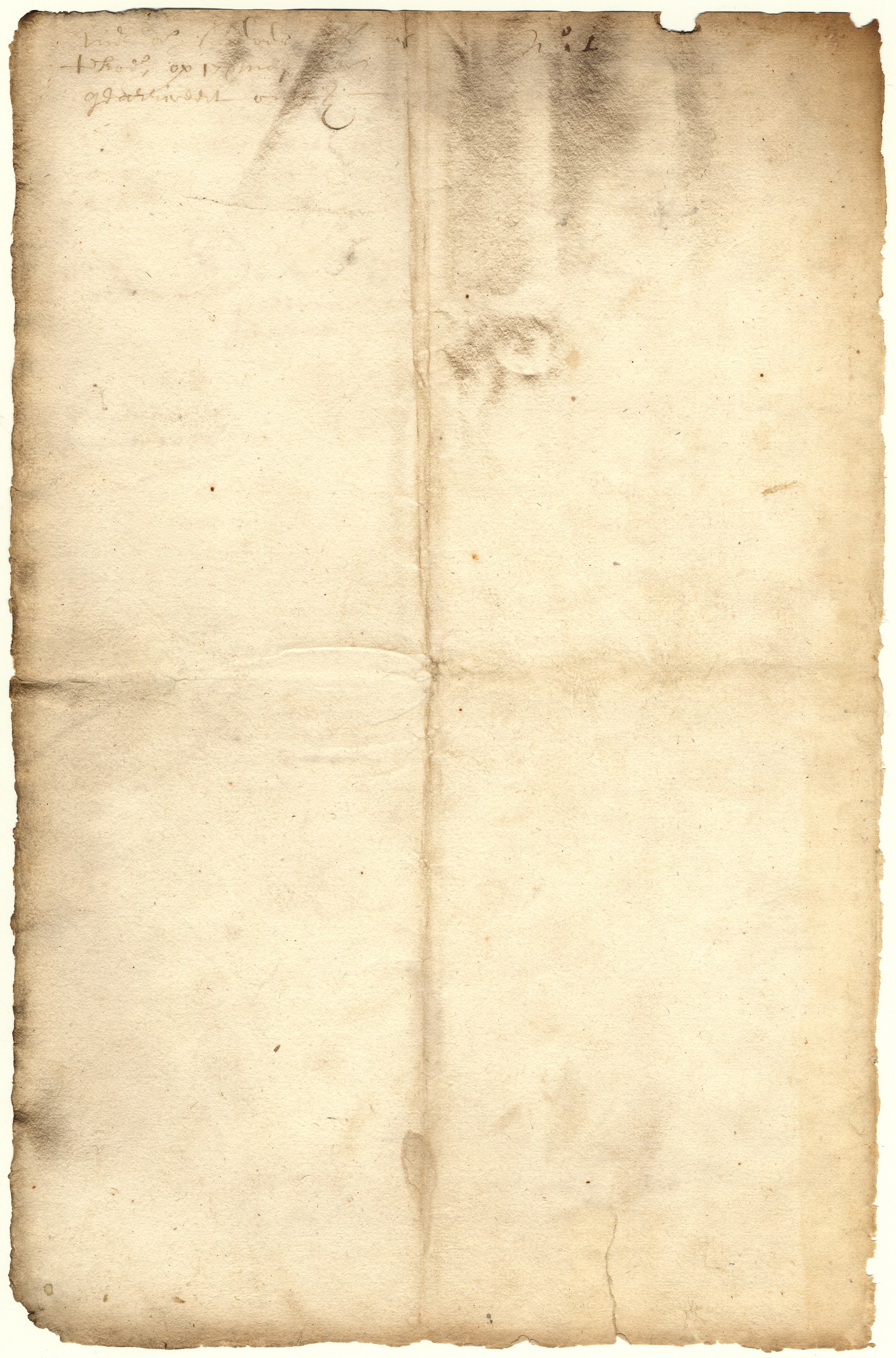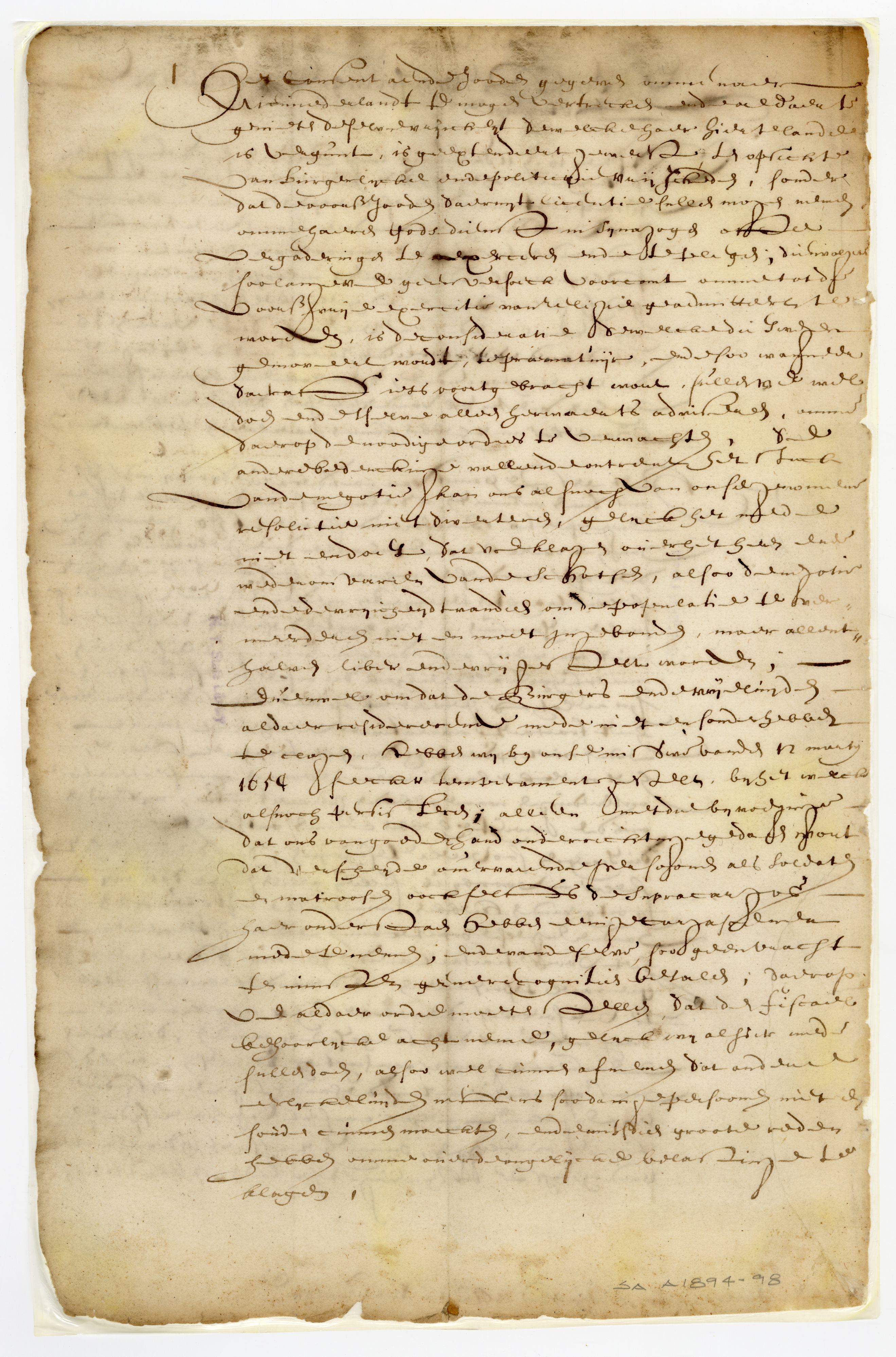The 13th of March.
Honorable, Prudent, Pious, Dear, Faithful.
The ships the Vergulde Beer, the Bontekoe and the Wittepaert, which sailed from there on the 21st of November of last year and meanwhile were obliged by contrary winds to run into Plymouth, safely, arrived at Texel on the 10th and 11th of January last past, God be praised. We received by them your letter of the 30th of October with enclosures,[1] which upon the occasion of the departure of the Bever and the Bontekoe we cannot omit to answer.
The first point of consideration in your letter is the agreement regarding the boundaries made with the English at Hartford in 1650, of which you would make us believe that a copy had been already sent, trying to prove it by the tenor of some of our answers. We do not consider it worth while to enter into a dispute about it, but say only that our statements were made upon your advice, in which you repeated the treaty narratively, and not upon the text of the treaty itself. If however the latter had been sent pursuant to our repeated demands, we might have saved ourselves the trouble to write you so often about it; but as all this is past, we shall only say that, in order to prevent and counteract all further evasions on the part of the English, we have resolved to lay the said treaty before their High: Might: the States General and ask for their approval, which if possible shall be dispatched with this letter. In that case however you must be careful and not let the approval out of your hands, unless the English can produce a similar document from their side, to avoid an injury to the respect and authority of the highest government of this country.
The permission given to the Jews to go to New Netherland and enjoy there the same privileges, as they have here, has been granted only as far as civil and political rights are concerned, without giving the said Jews a claim to the privilege of exercising their religion in a synagogue or at a gathering; as long therefore, as you receive no request for granting them this liberty of religious exercise, your considerations and anxiety about this matter are premature and when later something shall be said about it, you can do no better than to refer them to us and await the necessary order. Your next remark concerning trade does not as yet divert us from our resolution, nor do your complaints about the sailing back and forth of the scots,[2] because for the sake of increasing the population, trade and its freedom must not be hampered with, but ought to be relieved from all restrictions. However, to prevent complaints from the burghers and free people living there, we have made some modifications in our letter of March 12th, 1654,[3] which are still in force; we only add that we have been informed by trustworthy persons that various people going over, soldiers, sailors, even supercargoes dare to take with them goods and merchandise without paying freight or at least duties for them: you must see to it that the Fiscal pay proper attention, as we shall do here; for we can well understand that other honest people cannot compete with such men and have therefore good reason to complain of unequal taxation.
We will gladly approve of the expedition to the South River and of what has occurred and been done there, as substantially conforming to our intentions; only we would have preferred to see that no such formal capitulation had been made for the surrender of the fort, but that all had been done in the same manner, as the Swedes gave us an example of at Fort Casimir; our reason for it is that what is written and given in copy can be preserved for a long time and appears occasionally at the most awkward moment, while on the other side the spoken word or the deed is forgotten in the course of time or may be interpreted and smoothed over one way or the other, as the occasion may seem to demand. But as in the above case it has already been done, we have only wished to make this remark as a rule, if similar situations present themselves in the future. The aforesaid Fort Casimir must be properly provided and armed by you, but little attention need be paid to Fort Christina, where you will leave only 3 or 4 men to live there as garrison and to keep it in our possession; you must try to induce some private parties to remain there.
We cannot find that we have given directions to detain the ship de Waegh there until further orders; but we find that we directed you to dispatch her quickly in the early spring of this year, which we hope has been done and if not, we order expressly that it be done immediately, to relieve the Company of this heavy tax on its funds; remembering this tax you will take care to send in the said ship as much freight as you possibly can find. We had to promise to the soldiers sent in the ship from here that against their wish and will they should not be sent inland there, and you must keep that promise, but in the meantime you may try to persuade these soldiers or at least part of them to remain there voluntarily, in which case you may assure them that upon arrival of the ship the Waegh here the pay earned by them there shall be paid in full to their attorneys in the same manner, as if they were here themselves.
The only thing which has greatly disturbed and vexed us in your honors' last letter, is the sad misfortune, which befell us unexpectedly from the natives;[4] the considerations, which arise therefrom, are whether to make some arrangement with them or revenge the bloodshed and inflicted damages in a proper manner; we can as yet come to no final conclusion about the one or the other. The first would be best adapted to the present condition of the Company, while the other is the safest and most necessary, so that we may not be subject to such unlucky events in future, whenever the desires and rapaciousness of the Indians call for it. We shall communicate the whole matter to the Government of these States and ask them also for the needed assistance, of which we shall give further information to your honors in due time. Meanwhile we would recommend your honors to bring your affairs provisionally to such a condition that not only the poor prisoners may be ransomed in a suitable manner and returned to their families, but also such precautions may be taken at every instance that such disasters are not to be feared in the future. Your honors are on the spot there and better informed of everything, than we, who cannot judge so well of the particular circumstances and consequently cannot give advice from here. Your honors' proposition, made for the security of the people in the open country, to settle in close neighborhood and provide their settlements with some means of defense, sufficient at least against an attack, is not extravagant, we think, and it would seem to be quite advisable, to make a provisional treaty that the Indians must keep away from the places, where our people have settled, but above all you ought to insist upon restitution of the stolen booty and extorted ransom, for else it must be feared that the Indians will be induced to take hold of the opportunity at the first pretended unlucky event; we leave it to your honors' own consideration, what steps might be taken for this purpose towards an offensive alliance with the English, for which plans have been made before.
As to the requested subsidy for the suffering and impoverished people, for which your honors propose the hundredth penny of the real estate tax, which we have since changed to the twentieth penny on the houses and the tenth on the plantations and bouweries, which remained intact, we are satisfied that the aforesaid revenue may provisionally be used therefor this year and shall likewise exert ourselves and see, whether something can be obtained for the relief of these poor people besides the succor, which we ask from the City.
To prevent as much as possible all chances that the Indians may be provided with arms by our people, to their own damage, we have resolved upon your honors' proposal that the passengers and free men, who may henceforth go to New Netherland, shall be obliged from now to take with them a matchlock in place of a flintlock, as may be seen by their passports.
Thus far for the present in answer to your letter; what follows is for your instruction and information.
On account of the manifold complaints made to us from time to time against Cornelis van Tienhoven, the fiscal, and his brother Adrian van Tienhoven, commissary of imported goods and merchandise, we have decided to dismiss them from the service of the Company and further order and direct that neither of them shall henceforth be employed in any public service or civil office. You will let the first councilor, Nicasius de Sille, provisionally perform the duties of fiscal and engage as commissary some other fit and honest person. We intend however, to keep the Company's warehouse there henceforth well provided with soldiers' clothing and what belongs to it; the ship the Bontekoe is now already taking over something of the kind, for which see the enclosed manifests and bills of lading; for the distribution and management of them a faithful and honest man is needed as commissary, who shall be held responsible for the property and give a detailed account of it from time to time and we desire it to be expressly understood that we expect such account to be rendered to us, because we shall charge the account of the warehouse administrators with whatever is sent to him. We think therefore that the duties of both inspector and commissary can be performed by one honest and experienced man, and it you believe Johan de Deckere the right man, of which we have no doubt, you may appoint him and for the present let him also take one of the members of the council, but if the aforesaid Decker does not like it or cannot well be missed from his present office, then we approve of his appointment as chief commissary at Fort Orange in place of Dijckman.
Concerning the petition submitted to us by the person of Cornelis Martsen, factor, trading in New Netherland, it can be seen from the same petition, which we resolved to send on to your honors together with the attached papers, with the stipulation and order that your honors give the aforesaid petitioner, Cornelis Martsen, his requested compensation through the Fiscal Tienhoven, if the wines stated in the aforesaid petition and attachments have not been confiscated by judgment.
We enclose the act of approval just received from their High Mightinesses the States General for the settlement of the boundaries agreed upon at Hartford in New England in 1650. As we have said above, you must be careful and not let the document pass out of your hands, unless the New England people can exhibit and submit a similar consent and approval from their superiors.
The care and tender affection, which we have had all the time for promoting the increase of population and the cultivation of New Netherland, has induced us to resolve and decide that henceforth all mechanics and farmers, who can prove their ability to earn a living there, shall receive free passage for themselves, their wives and children; provided that whenever they wish to return here, they shall pay double fare. Just as we have also decided for the benefit of the inhabitants there to trouble the burgomasters of this city again and request their worships' assistance in our endeavors to have New Netherland tobacco exempted from the duties here. We have yet to learn the success thereof.
We have been highly astonished that in your letter you say not a word about the dyewood in the above mentioned ships. Although we suppose we know the truth about it, yet we cannot say, whether it was forgotten by accident and stuck in the pen and are completely ignorant of the facts. You will therefore send us by the next ship a full report and information about it; do not fail to do so. You must also send us an account and report on the horses and salt, brought there in the Liefde, by Anne Douwesen, skipper from Curacao that we may make sure of it and see what disposition has been made of them.
We are informed here that a cask containing 90 hats marked WH [ actual mark ] and after the closing of the manifests on board de Waegh by the widow of Willem Hensen for Cornelis van Ruyven, has not turned up there and as the duties for it have been promptly paid to the Company, inquiries should be made of Captain Coninck and of the skipper of the aforesaid ship the Waegh and the cask must be found to prevent just complaints.
The enclosed list will tell you the number of soldiers, going over with these ships.[5] We wish we could have engaged more of them, but for the present it was impossible. You may expect the rest with the next ships and as on account of the sudden and unexpected departure the soldiers now going have not taken the oath here, we recommend that you administer it to them upon their arrival.
The hasty departure of the ships is also the cause of our sending only part of the ammunition, which we had decided to send according to the enclosed statement;[6] there still remain here 100 firelocks and matchlocks and 50 pistols, which could not all be made and got ready. We must therefore await for them the next opportunity. You will see from the enclosed manifest how much ammunition we send at present by the Bontekoe, also what tools and implements for securing prisoners, heretofore required.
We close herewith and shall reply to all unanswered points in your letter by the next ship; meanwhile you will punctually execute our orders, as the service of the Company requires it.
Honorable, Prudent, Pious, Beloved, Faithful, we commend your honors to God's holy protection, and remain
Amsterdam, 13th of March 1656.
Enclosed is the invoice of private goods and merchandises, shipped in the Bever. The Fiscal must pay proper attention to its unloading.
David van Baerle
Edward Man
Abr. Wilmerdonx
Ab. de Decker de Jonge
Rights: This translation is provided for education and research purposes, courtesy of the New York State Library Manuscripts and Special Collections, Mutual Cultural Heritage Project. Rights may be reserved. Responsibility for securing permissions to distribute, publish, reproduce or other use rest with the user. For additional information see our Copyright and Use Statement Source:New York State Archives. New York (Colony). Council. Dutch colonial administrative correspondence, 1646-1664. Series A1810-78. Volume 12, document 36, page 1, side 1.

